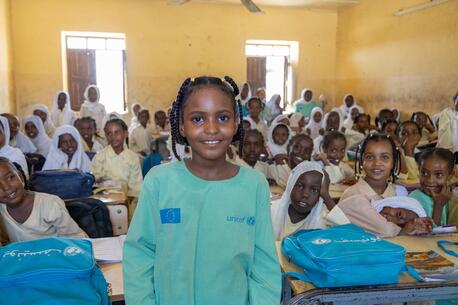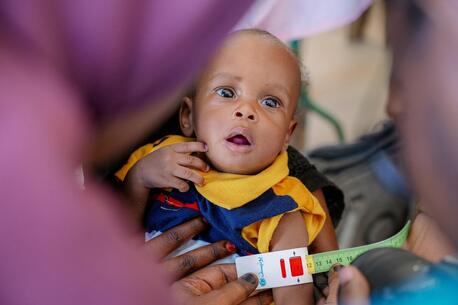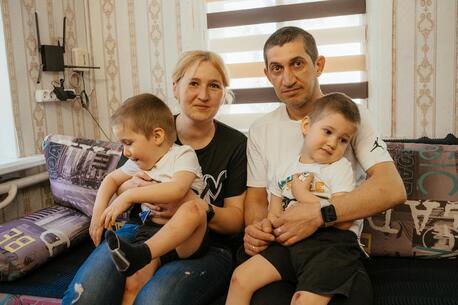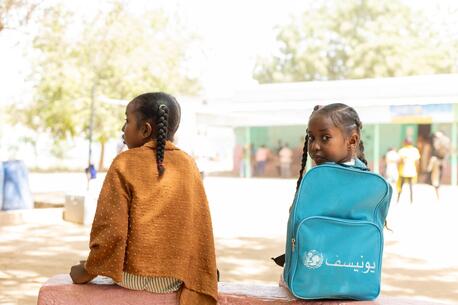
UNICEF Safe Learning Spaces a Haven for Children in War-Torn Sudan
For 10-year-old Naba, displaced by conflict in Sudan, a UNICEF-supported safe learning space in Kassala is a place to play, learn and just be a kid again.
Sudan has the world's largest internally displaced population
Armed conflict in Sudan has pushed 5 million children and their families out of their homes. One in every five people across the country is internally displaced.
Ten-year-old Naba and her mother have been living with her grandparents in Kassala state, eastern Sudan, since they fled violence in Khartoum in June 2023. These days, Naba spends her days at lshargia girls' school, which has been converted into a safe learning space, also known as a Makanna, where children can go to learn, play, make friends and receive integrated services.
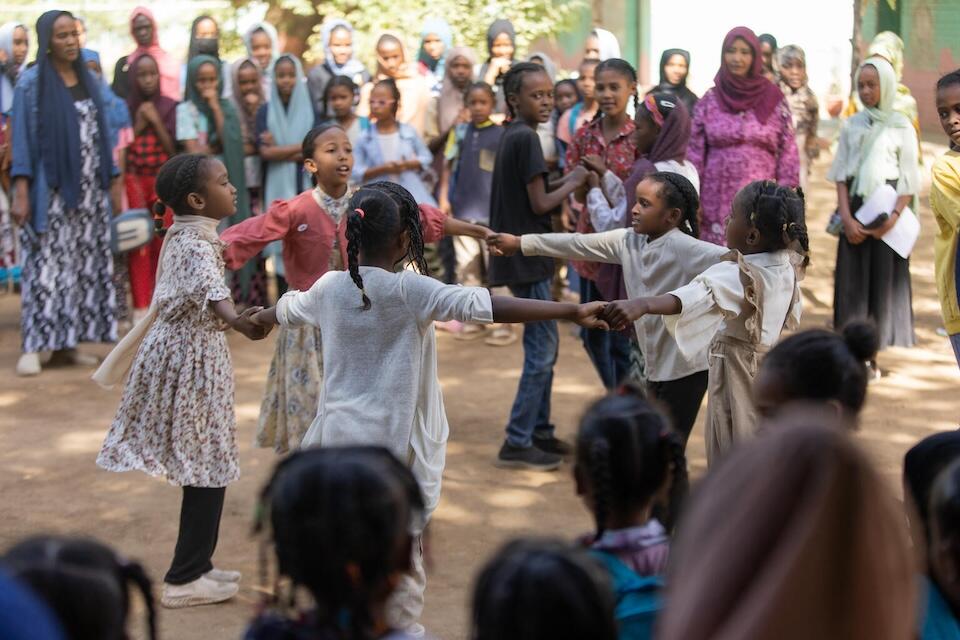
"We wash our hands here," Naba says, taking visitors on a video tour, before moving on to morning assembly and e-learning classes. In the afternoons, there's time for basketball and other games and activities.
We love Makanna because it helped us forget about the war. It has a lot of different activities, and it made us feel happy. — Naba, age 10
There's also a psychologist, who helps children process the trauma they've experienced. "If we have any problem, we go to her," Naba says. "Some children used to cry a lot, but we started talking to each other and became friends.
"We love Makanna because it helped us forget about the war," says Naba. "It has a lot of different activities, and it made us feel happy."
Watch the video:
All children have the right to be safe wherever they are
The humanitarian crisis closed Sudan's schools for more than a year. UNICEF safe spaces provide children with informal learning opportunities to ensure they don’t forget what they previously learned.
Some 631 children are hosted daily at the Makanna Naba attends, supported by four facilitators and 15 dedicated volunteers. Through the e-learning sessions, children have access to simple literacy, mathematics, Arabic and English lessons.
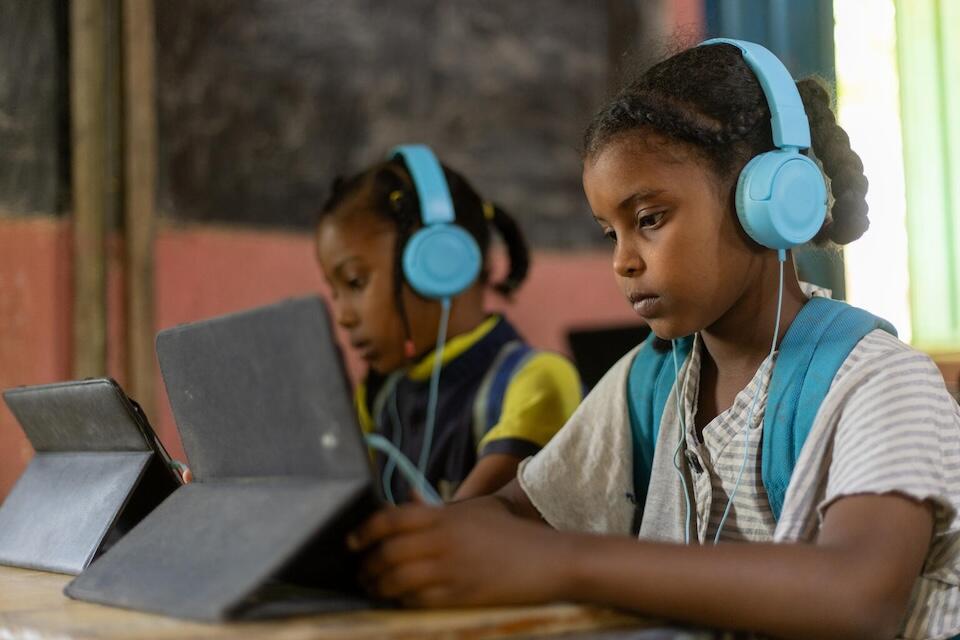
An integrated approach to delivering services to children
With the continued support from the German Federal Ministry for Economic Cooperation and Development (BMZ) through the KfW German Development Bank, UNICEF and its partners run 20 safe learning spaces benefiting almost 5,000 children in Kassala.
Across the country, UNICEF is working to expand the integrated approach, combining education with specialized child protection services and the provision of basic water, sanitation, and hygiene (WASH) services. All these initiatives are designed to support children's overall growth, well-being and protection, nurturing their physical, social, and emotional development.
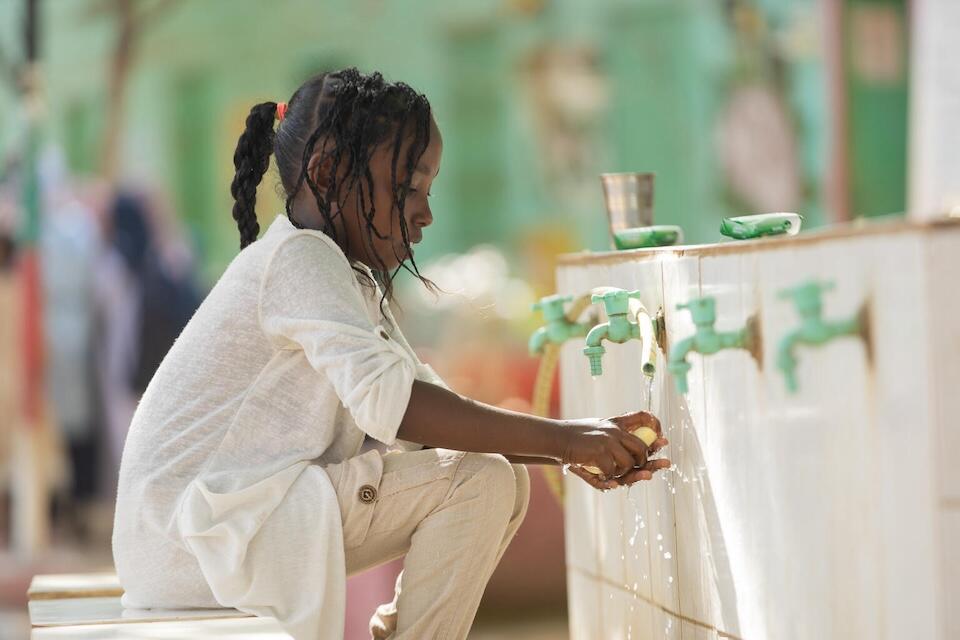
Digital learning helps children continue their education
Since the beginning of 2024, UNICEF has established 699 safe learning spaces for children in Sudan. Sixty of them provided digital learning through the Let us Learn initiative to over 12,660 children (54 percent girls) including refugees and children on the move, in East Darfur, South Darfur, Kassala, White Nile, Blue Nile, Red Sea, River Nile and Northern states.
Between January 2024 and June 2024, UNICEF reached 2.1 million children and caregivers impacted by the war in Sudan with psychosocial counseling, learning and protection support.
UNICEF is providing urgent assistance to Sudan's children, but more help is needed. Your contribution will make a difference. Please donate today.
This story was adapted from unicef.org
HOW TO HELP
There are many ways to make a difference
War, famine, poverty, natural disasters — threats to the world's children keep coming. But UNICEF won't stop working to keep children healthy and safe.
UNICEF works in over 190 countries and territories — more places than any other children's organization. UNICEF has the world's largest humanitarian warehouse and, when disaster strikes, can get supplies almost anywhere within 72 hours. Constantly innovating, always advocating for a better world for children, UNICEF works to ensure that every child can grow up healthy, educated, protected and respected.
Would you like to help give all children the opportunity to reach their full potential? There are many ways to get involved.



